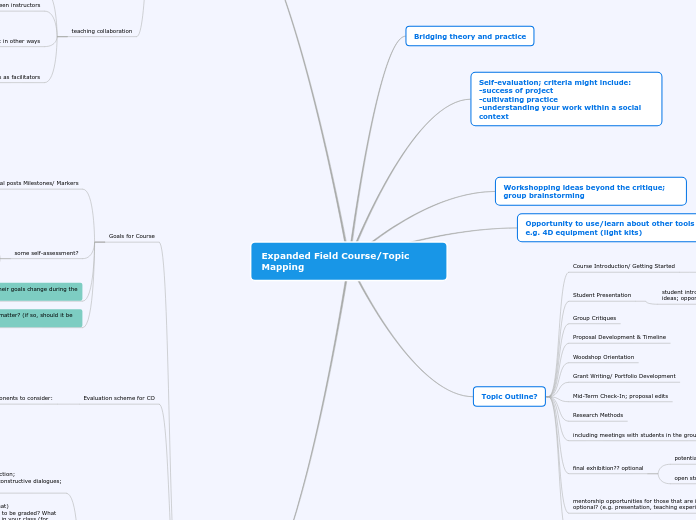Expanded Field Course/Topic Mapping
Assessment
ideas about ungrading
doesn't have to be all or nothing
it needs to be done WITH students
students can engage in the process and find meaning within
its about making assessment meaningful- and more focused on learning
institution requires a grade
perhaps students could choose whether they wanted a grade (for GPA) or a 'P'
pass/fail is/may be an option
how does this impact articulation agreements? scholarships? transferability? grad school applications?
P = no GPA attached
brings up big institutional questions
one approach (Colleen & Hillarie) = no grades on assignments
misalignments between students & instructors forced a dialogue with the students
too low
gender divide emerged (women can tend to grade themselves to harshly)
too high
dialogue about the pressures for student achievement; ended with compromise
lots student self-reflection to provide a narrative about how they graded themselves
instead give lots of qualitative feedback on student work
and lots of self-reflection
also peer assessment
allows student to focus on things other than numbers
requires transparency with students
and being open about the biases that we bring
need to take time to teach students about pedagogy
explain WHY this approach
requires trust between instructors and students
focus on relationship
Challenges/Questions:
Questions posted by Colleen (in Zoom chat)
1. Why do we grade? How does it feel to be graded? What do you want grading to do (or not to do) in your class (for students or instructors)?
2. What do letter grades mean? Do they have any intrinsic meaning or is their value purely extrinsic? Is assessment different when it is formative rather than summative?
3. How does feedback function in relation to grades? To what extent should teachers be readers/receivers/reviewers of student work (as opposed to evaluators)?
4. What would happen if you didn’t grade? What would be the benefits? What issues would this raise for students/instructors? What are the risks of not grading?
5. Who is the primary audience for the work students produce in the class?
students struggled with reflection;
students struggling to have constructive dialogues;
scaffolding/supports needed
reflection is skill that needs to be taught and support
-what does it look like to reflect
-show some examples
Evaluation scheme for CO
Components to consider:
Attendance/Participation
Presentation
Final Project
Mid-Term Reflection/ Proposal update
Timeline
Proposal
Goals for Course
Q from Colleen: Does the process matter? (if so, should it be evaluated?) Or only the product?
final presentation on process? or product?
Q from Colleen: What happens if their goals change during the course? Is that ok?
some self-assessment?
questions about feeling safe having difficult conversations with students; THIS IS REALLY IMPORTANT
possibly self-reflection
shared goal posts Milestones/ Markers
opportunity to self-identify to set indiv goals
common touchpoints
creating a timeline
coming to class
co-teaching
teaching collaboration
instructors as facilitators
work of collaboration was beneficial and efficient in other ways
determine roles and responsibilities of each instructor
when would there be dedicated time for the instructors to meet and 'prep'?
need for implicit trust between instructors
divide and conquer for some things
play to individual instructor strengths, interests, etc.
managing instructor workload
office hours as well for student meetings
dedicating class time to doing some of the 1-on-1 meetings
How can we make sure class time is valuable for all students?
clear expectations around how & when to connect with instructor; set up a structure ahead of time
include expectations around advisor appointments as a component of the proposal/application
work involved with mentoring students
1 or 2 faculty advisors per student?
role of mentorship?
important for balancing workload for instructors
students to choose their mentor?
probably not
final exhibition and final 1-on-1 check in
1-on-1 mid-term meetings
all instructors present for first few weeks (e.g. intro/orientations/ student presentations)
13 week plan
3 hour session each week
shared responsibilities for different group sessions
Topic Outline?
opportunities for engagement with learning activities of the Foundation Level
mentorship opportunities for those that are interested-- optional? (e.g. presentation, teaching experience)
final exhibition?? optional
open studio walk-a-bout
potential opportunity to share space with foundation year
including meetings with students in the group sessions
Research Methods
Mid-Term Check-In; proposal edits
Grant Writing/ Portfolio Development
Woodshop Orientation
Proposal Development & Timeline
Group Critiques
Student Presentation
student introducing their own practices to cohort; sharing ideas; opportunities for collaboration
Course Introduction/ Getting Started
Goal setting
what are the different 'options' available for growth and development? (e.g. mentorship opportunities, exhibition, teaching experience)
Opportunity to use/learn about other tools e.g. 4D equipment (light kits)
Workshopping ideas beyond the critique; group brainstorming
Self-evaluation; criteria might include:
-success of project
-cultivating practice
-understanding your work within a social context
Bridging theory and practice

